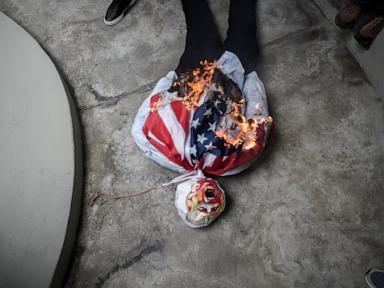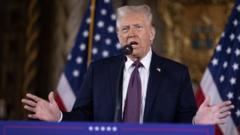Panama’s careful course through the canal crisis sparked by Trump

President Trump escalated tensions with Panama to unprecedented levels on Sunday, threatening to “recover the Panama Canal” even as Secretary of State Marco Rubio conducted delicate negotiations in Panama City.
“Something very powerful is going to happen,” Trump warned from Washington, casting a shadow over Rubio’s diplomatic mission and pushing hemispheric relations to their most precarious point since the 1989 U.S. invasion of Panama.
“The canal is not for China,” Trump declared to U.S. media, asserting that Panama had “violated the agreement” and making the extraordinary claim that 70 percent of canal signage appears in Chinese. His declaration that “China is running the Panama Canal” and that Panama’s actions threaten “the financial security of this part of the world” ignited immediate diplomatic tremors.
Trump subsequently announced plans for a direct phone conversation with Panamanian President José Raúl Mulino on Friday, and, while acknowledging Rubio’s “very good” meeting, expressed dissatisfaction with Panama’s commitments. “Essentially, they’ve committed to certain things, but I’m not happy with it,” Trump stated.
Mulino performed with calculated precision, balancing concession with sovereignty. Following what he described as a “highly respectful and cordial” meeting with Rubio, Mulino revealed his administration’s most significant shift: Panama would not renew its 2017 Belt and Road Initiative memorandum with China. Going further, Mulino indicated openness to terminating the agreement before its expiration date, stating, “We’ll study the possibility of terminating it early.” This agreement, previously extended in 2020 and 2023, had established expansive cooperation in infrastructure, trade, technology and cultural exchange.
Addressing Trump’s accusations directly, Mulino unveiled unprecedented oversight measures. For the first time since its 1997 concession, Panama has launched comprehensive audits of both ports operated by Hong Kong-based Hutchison. These facilities, strategic anchors at each end of the canal, have long symbolized China’s commercial presence in the region.
“The canal grew in Panamanian hands,” Mulino asserted, highlighting the $5 billion expansion as evidence of successful local management. He carefully delineated constitutional boundaries, explaining that presidential authority stops at the canal’s autonomous administration — a subtle reminder of established legal frameworks governing the waterway.
The diplomatic choreography extended beyond canal operations. Mulino offered the Nicanor airstrip in Darién for expanded migrant repatriation efforts, acknowledging emerging security challenges. This commitment materialized dramatically the next morning, as Rubio stood at Albrook International Airport watching a deportation flight carrying 43 undocumented Colombians — 32 men and 11 women, including seven with criminal records — returning to their homeland. The flight exemplified the success of a $2.7 million U.S.-funded initiative launched with Mulino’s administration in July 2024, which has facilitated over 40 charter flights, returning more than 1,700 migrants across 14 countries.
“This is an effective way to stem the flow of illegal migration, of mass migration, which is destructive and destabilizing,” Rubio told reporters at Albrook, highlighting Panama’s reported 90 percent decrease in Darién region crossings compared to the previous year.
Rubio’s mission walked a diplomatic tightrope. The secretary delivered Trump’s “preliminary determination“ that Chinese Communist Party influence threatens the waterway and violates the Neutrality Treaty. Yet discussions yielded practical cooperation frameworks, suggesting paths toward resolution.
By afternoon, the Panama Canal Authority extended a significant gesture, committing to optimize priority transit for U.S. Navy vessels. This technical accommodation demonstrated Panama’s willingness to address American concerns while maintaining operational independence.
Mulino’s assessment of U.S. engagement proved particularly pointed. He urged Washington to increase investment in Panama, noting America had “left many chairs empty over these years,” including a crucial four-year ambassador vacancy. This diplomatic void, he suggested, created space for other nations’ influence.
“The canal fuses with Panamanians, Panamanians with the Canal, as a single entity,” Mulino explained, articulating both national pride and pragmatic cooperation. His emphasis on waiting for “technical instances of the canal to clarify the president’s concerns about Chinese presence” demonstrated Panama’s commitment to proper diplomatic channels.
The afternoon brought another significant development as Rubio toured the Miraflores Locks, engaging directly with canal operations. The Canal Authority’s technical briefings emphasized operational excellence and strict neutrality protocols, subtly countering Trump’s claims about Chinese influence. Senior canal officials presented detailed statistics about vessel transit patterns, workforce composition and security measures — data that appeared to challenge several of Trump’s assertions about Chinese control.
Beyond the immediate crisis, the confrontation raises fundamental questions about the nature of sovereignty in an age of global infrastructure. The Panama Canal, while operated under Panamanian authority, serves as a crucial artery for global commerce. This reality creates an inherent tension between national sovereignty and international interests, a dynamic that Panama has skillfully managed for decades — until this current challenge to its stewardship.
As night fell on this consequential Sunday, the contrast between Trump’s confrontational rhetoric and the measured tone of direct diplomatic engagement highlighted the complexities of modern international relations. The coming days, particularly Friday’s call between Trump and Mulino, will likely determine whether careful diplomacy can bridge the gap between presidential demands and Panama’s sovereign rights, with implications that will resonate throughout the hemisphere.
Nivia Rossana Castrellón is the former deputy minister of foreign affairs of the Republic of Panama.
-

Panama defiant as Trump administration tries to take control of Panama Canal
Secretary of State Marco Rubio will be in Panama Saturday on his first trip in his new role. Panamanian officials were defiant about maintaining control of the Panama Canal after President Trump ...NBC News - 5d -

Does China 'operate' Panama Canal, as Trump says?
The US president says the US should "take back" the famous waterway because China runs it now.BBC News - Jan. 22 -

Russia warns Trump against seizing Panama Canal
Russia warned President Trump on Tuesday against seizing the Panama Canal, after he reiterated his intent to take control of the strategic waterway in his second inaugural address Monday. "We ...The Hill - Jan. 21 -

President of Panama: 'The canal is and will remain Panama's'
Panamanian President José Raúl Mulino says his nation intends to maintain control of the Panama Canal, after President Trump reiterated his intent to take control of the strategic waterway in his ...The Hill - Jan. 20 -

Panama marks Martyrs' Day as Trump threatens to retake control of Panama Canal
A Panamanian national holiday remembering the killing of 21 protesters by police and U.S. troops in 1964 is taking on new resonance this year as U.S. President-elect Donald Trump threatens to take ...ABC News - Jan. 9 -
Why would Trump want Greenland and the Panama Canal?
Donald Trump says the U.S. needs control of Greenland and the Panama Canal "for national security." Here's why both places are so important.CBS News - Jan. 8 -

Trump suggests taking Greenland and Panama Canal by force
During an hourlong press conference, President-elect Trump mapped out headline-making plans for his administration — including seizing the Panama Canal and Greenland and renaming the Gulf of Mexico ...NBC News - Jan. 8 -

Trump ramps up threats to gain control of Greenland and Panama Canal
The president-elect said he would not rule out the use of military force to seize control of the Panama Canal and Greenland.BBC News - Jan. 8 -

Panama Unsettled by Trump Threat to Seize Canal
Few took the president-elect’s combative comments at face value, but they still sent a shudder through a country that the United States has invaded before.The New York Times - Jan. 8
More from The Hill
-

Elites, criminal networks and aid failures drive the immigration crisis
To break the cycle, U.S. aid must prioritize local empowerment, accountability and performance-driven results.The Hill - 19m -

Live updates: Courts pause federal buyouts, rule against Trump on birthright citizenship
A federal judge paused President Trump's sweeping buyout offer, delivering federal workers an extension until Monday to consider the deal. The move comes as agencies in recent days ramped up ...The Hill - 23m -

Federal judge pauses Trump federal worker buyouts
A federal judge on Thursday extended the deadline for federal workers to accept the Trump administration’s sweeping buyout offer. The court will weigh the merits of the bid to block the offer in a ...The Hill - 39m -

Judge rails against Trump in blocking birthright executive order for second time
A second federal judge indefinitely blocked President Trump’s executive order that would restrict birthright citizenship, harshly condemning the administration for attempting to do so at a Thursday ...The Hill - 44m -

Satisfaction with attitudes toward LGBTQ people lowest since 2013: Survey
Satisfaction with attitudes toward LGBTQ people are the lowest they have been since 2013, a survey from Gallup shows. In the survey, 51 percent of respondents said “the acceptance of gay and ...The Hill - 47m
More in Politics
-

Elites, criminal networks and aid failures drive the immigration crisis
To break the cycle, U.S. aid must prioritize local empowerment, accountability and performance-driven results.The Hill - 19m -

Live updates: Courts pause federal buyouts, rule against Trump on birthright citizenship
A federal judge paused President Trump's sweeping buyout offer, delivering federal workers an extension until Monday to consider the deal. The move comes as agencies in recent days ramped up ...The Hill - 23m -

Judge temporarily halts Trump federal buyout program
A federal judge in Boston has temporarily blocked the Trump administration's federal employee buyout program until Monday. NBC News' Yamiche Alcindor has details on the judge's decision and its ...NBC News - 37m -

Federal judge pauses Trump federal worker buyouts
A federal judge on Thursday extended the deadline for federal workers to accept the Trump administration’s sweeping buyout offer. The court will weigh the merits of the bid to block the offer in a ...The Hill - 39m -

Judge rails against Trump in blocking birthright executive order for second time
A second federal judge indefinitely blocked President Trump’s executive order that would restrict birthright citizenship, harshly condemning the administration for attempting to do so at a Thursday ...The Hill - 44m